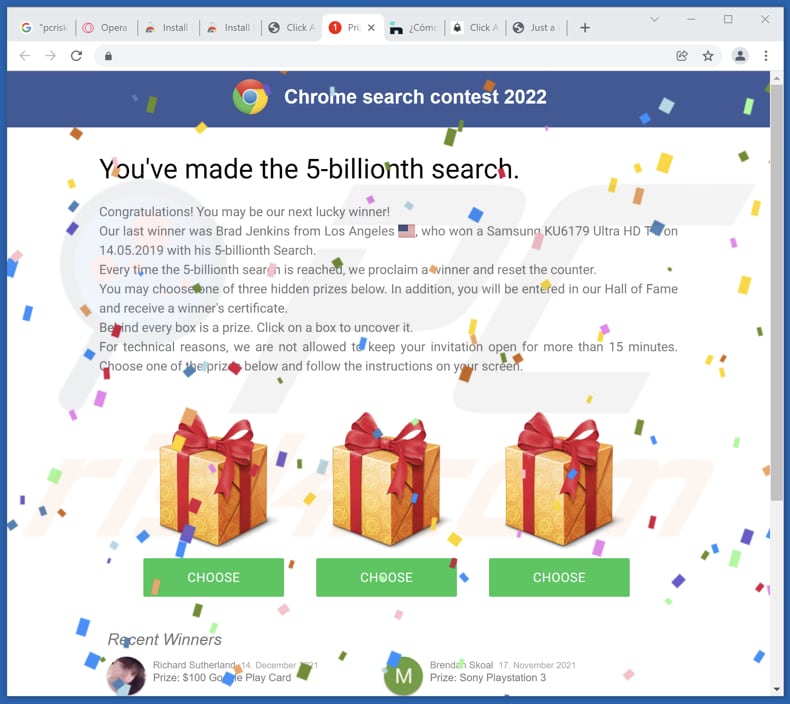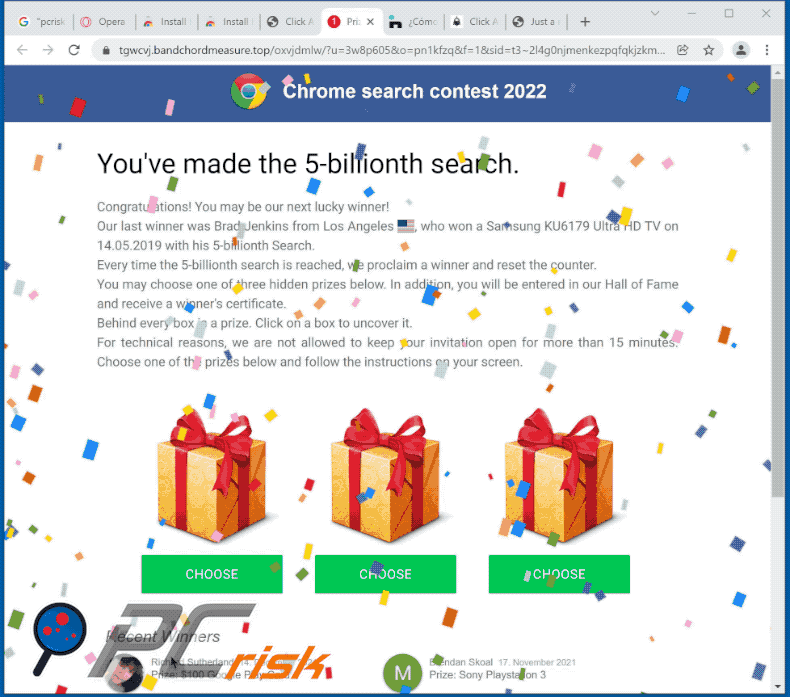How to recognize scams like Chrome Search Contest 2022 and avoid them
Phishing/ScamAlso Known As: Chrome Search Contest 2022 pop-up
Get free scan and check if your device is infected.
Remove it nowTo use full-featured product, you have to purchase a license for Combo Cleaner. Seven days free trial available. Combo Cleaner is owned and operated by RCS LT, the parent company of PCRisk.com.
What is Chrome Search Contest 2022 scam?
"Chrome search contest 2022" is a pop-up scam delivered by a deceptive website. It displays fake messages to trick unsuspecting visitors into providing personal information. As a rule, scams of this type are promoted through websites that use questionable advertising networks (users do not open these scam sites on purpose).

Chrome Search Contest 2022 scam in detail
The fake message in this pop-up scam claims that a visitor has done the 5-billionth search and has a chance to win Amazon, Google Play gift card, Apple Watch, or another prize. Usually, the purpose of such scams is to trick visitors into entering personal information such as credit card details, email, home address, or subscribing to unneeded paid services.
| Name | Chrome Search Contest 2022 pop-up |
| Threat Type | Phishing, Scam, Social Engineering, Fraud |
| Fake Claim | Visitors have an opportunity to win various prizes |
| Disguise | Legitimate Google website (contest) |
| Related Domain | bandchordmeasure[.]top, thusfeetexcept[.]xyz, meanthardsquare[.]xyz |
| Detection Names (bandchordmeasure[.]top) | Google Safebrowsing (Phishing), Kaspersky (Malware), Sophos (Spam), Full List Of Detections (VirusTotal) |
| Symptoms | Fake error messages, fake system warnings, pop-up errors, hoax computer scan. |
| Distribution methods | Compromised websites, rogue online pop-up ads, potentially unwanted applications. |
| Damage | Loss of sensitive private information, monetary loss, identity theft, possible malware infections. |
| Malware Removal (Windows) |
To eliminate possible malware infections, scan your computer with legitimate antivirus software. Our security researchers recommend using Combo Cleaner. Download Combo CleanerTo use full-featured product, you have to purchase a license for Combo Cleaner. 7 days free trial available. Combo Cleaner is owned and operated by RCS LT, the parent company of PCRisk.com. |
More about similar pop-up scams
A couple examples of similar scams are "Chrome Search Contest 2021", "Dear Chrome User, Congratulations!", "Google Membership Rewards". These scams often encourage visitors to complete a survey to claim their "prize". In some cases, scammers behind these pages can ask to pay a "transaction", "shipment", "administration", or other fees.
These scams are promoted through websites that use questionable advertising networks. Also, they can be promoted through potentially unwanted apps (PUAs), like adware. Either way, users end up on scam pages unintentionally.
How did potentially unwanted applications install on my computer?
Adware is distributed through downloaders and installers for other programs, shady advertisements, fake installers. When users do not change "Custom", "Advanced", or other settings available in installers (or downloaders), they agree to install (or download) adware too.
Advertisements used to distribute unwanted software are designed to run certain scripts. Users cause unwanted downloads or installations by clicking on those ads. Fake installers usually get downloaded from deceptive, potentially malicious pages.
How to avoid installation of potentially unwanted applications?
Applications and files should be downloaded only from official pages and direct links. Peer-to-Peer networks, third-party downloaders, unofficial pages, etc., can be used to distribute PUAs and malware. Downloaders and installers with "Custom", "Advanced" or other settings should be checked for unwanted apps before downloading or installing programs.
Advertisements appearing up on torrent sites, pages related to gambling, pornography, adult dating, or other questionable pages should not be clicked as well. If your computer is already infected with PUAs, we recommend running a scan with Combo Cleaner Antivirus for Windows to automatically eliminate them.
The appearance of the Chrome Search Contest 2022 scam (GIF):

Text in this scam:
Chrome Search Contest 2022
You've made the 5-billionth search.
Congratulations! You may be our next lucky winner!
Our last winner was Brad Jenkins from Los Angeles , who won a Samsung KU6179 Ultra HD TV on 14.05.2019 with his 5-billionth Search.
Every time the 5-billionth search is reached, we proclaim a winner and reset the counter.
You may choose one of three hidden prizes below. In addition, you will be entered in our Hall of Fame and receive a winner's certificate.
Behind every box is a prize. Click on a box to uncover it.
For technical reasons, we are not allowed to keep your invitation open for more than 15 minutes. Choose one of the prizes below and follow the instructions on your screen.
Instant automatic malware removal:
Manual threat removal might be a lengthy and complicated process that requires advanced IT skills. Combo Cleaner is a professional automatic malware removal tool that is recommended to get rid of malware. Download it by clicking the button below:
DOWNLOAD Combo CleanerBy downloading any software listed on this website you agree to our Privacy Policy and Terms of Use. To use full-featured product, you have to purchase a license for Combo Cleaner. 7 days free trial available. Combo Cleaner is owned and operated by RCS LT, the parent company of PCRisk.com.
Quick menu:
- What is Chrome Search Contest 2022 pop-up?
- How to identify a pop-up scam?
- How do pop-up scams work?
- How to remove fake pop-ups?
- How to prevent fake pop-ups?
- What to do if you fell for a pop-up scam?
How to identify a pop-up scam?
Pop-up windows with various fake messages are a common type of lures cybercriminals use. They collect sensitive personal data, trick Internet users into calling fake tech support numbers, subscribe to useless online services, invest in shady cryptocurrency schemes, etc.
While in the majority of cases these pop-ups don't infect users' devices with malware, they can cause direct monetary loss or could result in identity theft.
Cybercriminals strive to create their rogue pop-up windows to look trustworthy, however, scams typically have the following characteristics:
- Spelling mistakes and non-professional images - Closely inspect the information displayed in a pop-up. Spelling mistakes and unprofessional images could be a sign of a scam.
- Sense of urgency - Countdown timer with a couple of minutes on it, asking you to enter your personal information or subscribe to some online service.
- Statements that you won something - If you haven't participated in a lottery, online competition, etc., and you see a pop-up window stating that you won.
- Computer or mobile device scan - A pop-up window that scans your device and informs of detected issues - is undoubtedly a scam; webpages cannot perform such actions.
- Exclusivity - Pop-up windows stating that only you are given secret access to a financial scheme that can quickly make you rich.
Example of a pop-up scam:

How do pop-up scams work?
Cybercriminals and deceptive marketers usually use various advertising networks, search engine poisoning techniques, and shady websites to generate traffic to their pop-ups. Users land on their online lures after clicking on fake download buttons, using a torrent website, or simply clicking on an Internet search engine result.
Based on users' location and device information, they are presented with a scam pop-up. Lures presented in such pop-ups range from get-rich-quick schemes to fake virus scans.
How to remove fake pop-ups?
In most cases, pop-up scams do not infect users' devices with malware. If you encountered a scam pop-up, simply closing it should be enough. In some cases scam, pop-ups may be hard to close; in such cases - close your Internet browser and restart it.
In extremely rare cases, you might need to reset your Internet browser. For this, use our instructions explaining how to reset Internet browser settings.
How to prevent fake pop-ups?
To prevent seeing pop-up scams, you should visit only reputable websites. Torrent, Crack, free online movie streaming, YouTube video download, and other websites of similar reputation commonly redirect Internet users to pop-up scams.
To minimize the risk of encountering pop-up scams, you should keep your Internet browsers up-to-date and use reputable anti-malware application. For this purpose, we recommend Combo Cleaner Antivirus for Windows.
What to do if you fell for a pop-up scam?
This depends on the type of scam that you fell for. Most commonly, pop-up scams try to trick users into sending money, giving away personal information, or giving access to one's device.
- If you sent money to scammers: You should contact your financial institution and explain that you were scammed. If informed promptly, there's a chance to get your money back.
- If you gave away your personal information: You should change your passwords and enable two-factor authentication in all online services that you use. Visit Federal Trade Commission to report identity theft and get personalized recovery steps.
- If you let scammers connect to your device: You should scan your computer with reputable anti-malware (we recommend Combo Cleaner Antivirus for Windows) - cyber criminals could have planted trojans, keyloggers, and other malware, don't use your computer until removing possible threats.
- Help other Internet users: report Internet scams to Federal Trade Commission.
Frequently Asked Questions (FAQ)
What is a pop-up scam?
A pop-up scam is a fake message (for example, a fake virus or error notification) designed to trick users into performing specific actions. Usually, websites delivering pop-up scams are disguised as legitimate/official pages.
What is the purpose of a pop-up scam?
The purpose of a pop-up scam can be to trick users into infecting computers with malware, installing other unwanted software, providing personal information, granting remote access to a computer, transferring money.
Why do I encounter fake pop-ups?
Most pop-up scams are delivered by websites that use questionable advertising networks. Users do not open these pages intentionally - they get redirected to them through other shady pages, advertisements.
Will Combo Cleaner protect me from pop-up scams?
Combo Cleaner can scan every website and detect malicious ones. Pages running pop-up scams also fall under this category. Therefore, this application will warn you immediately and restrict access to malicious pages.
Share:

Tomas Meskauskas
Expert security researcher, professional malware analyst
I am passionate about computer security and technology. I have an experience of over 10 years working in various companies related to computer technical issue solving and Internet security. I have been working as an author and editor for pcrisk.com since 2010. Follow me on Twitter and LinkedIn to stay informed about the latest online security threats.
PCrisk security portal is brought by a company RCS LT.
Joined forces of security researchers help educate computer users about the latest online security threats. More information about the company RCS LT.
Our malware removal guides are free. However, if you want to support us you can send us a donation.
DonatePCrisk security portal is brought by a company RCS LT.
Joined forces of security researchers help educate computer users about the latest online security threats. More information about the company RCS LT.
Our malware removal guides are free. However, if you want to support us you can send us a donation.
Donate
▼ Show Discussion